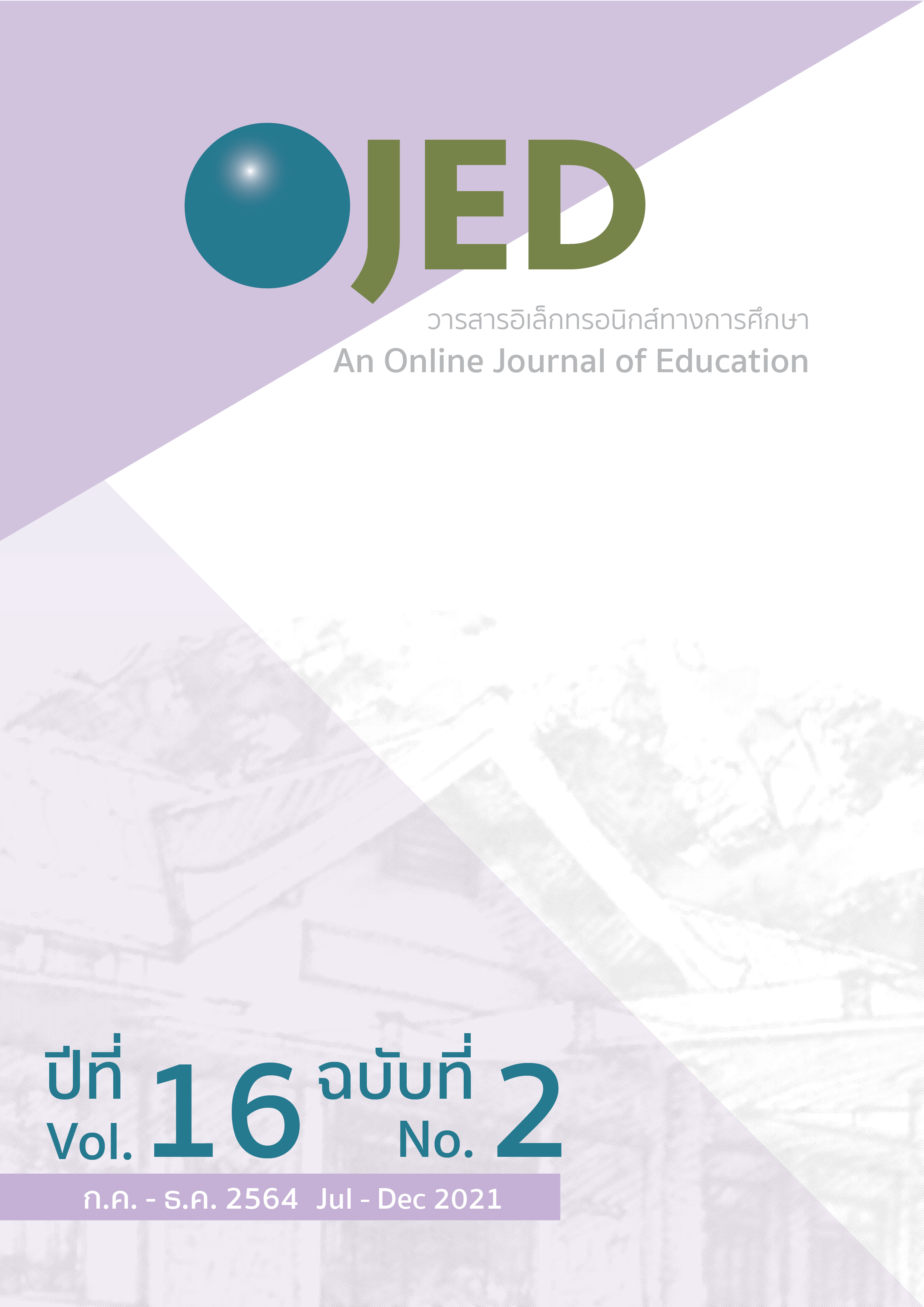ความเชื่อและแนวการปฏิบัติของครูที่มีต่อการสอนการออกเสียงภาษาอังกฤษของครูระดับมัธยมศึกษาตอนปลายที่สอนภาษาอังกฤษเป็นภาษาต่างประเทศในมณฑลยูนนาน สาธารณรัฐประชาชนจีน
DOI:
https://doi.org/10.14456/ojed.2021.17คำสำคัญ:
ความเชื่อครูสอนภาษาอังกฤษเป็นภาษาต่างประเทศ, การสอน, การออกเสียงภาษาอังกฤษบทคัดย่อ
การศึกษาครั้งนี้มีวัตถุประสงค์ดังนี้ 1) เพื่อตรวจสอบศึกษาความเชื่อของครูมัธยมปลายที่สอนภาษาอังกฤษเป็นภาษาต่างประเทศที่มีต่อการสอนการออกเสียงภาษาอังกฤษ 2) เพื่อศึกษาการสอนการออกเสียงภาษาอังกฤษที่ครูมัธยมปลายที่สอนภาษาอังกฤษเป็นภาษาต่างประเทศที่ใช้ในมณฑลยูนนานกลุ่มตัวอย่างเป็นครูโรงเรียนมัธยมปลายที่สอนภาษาอังกฤษเป็นภาษาต่างประเทศ59 คนในมณฑลยูนนานโดยการสุ่มแบบเจาะจง เครื่องมือวิจัยมี 3 ชิ้น ได้แก่ 1) แบบสอบถามออนไลน์ 2) การสัมภาษณ์กึ่งโครงสร้าง และ 3) การสังเกตการสอนในห้องเรียน ข้อมูลเชิงปริมาณซึ่งวิเคราะห์โดยสถิติเชิงบรรยาย ประกอบด้วยค่าเฉลี่ยและส่วนเบี่ยงเบนมาตรฐาน และข้อมูลเชิงคุณภาพวิเคราะห์โดยใช้การวิเคราะห์เนื้อหา ผลการวิจัยพบว่า 1) ความเชื่อของครูสอนภาษาอังกฤษเป็นภาษาต่างประเทศในยูนนานที่มีต่อการสอนการออกเสียงนั้นเป็นไปในเชิงบวกอและส่วนใหญ่เชื่อว่าการสอนการออกเสียงภาษาอังกฤษนั้นจำเป็น เป้าหมายในการสอนการออกเสียงผสมผสานระหว่างการออกเสียงเหมือนเจ้าของภาษาและการออกเสียงเพื่อความเข้าใจ 2) ครูสอนภาษาอังกฤษเป็นภาษาต่างประเทศของยูนนานใช้เวลาน้อยในการสอนเสียงสระและพยัญชนะและการเน้นเสียง จังหวะ และทำนองเสียง เนื่องจากระบบการสอนที่เน้นการสอบ การมีเวลาจำกัด และขาดการฝึกอบรมในการสอนการออกเสียง ครูสอนภาษาอังกฤษเป็นภาษาต่างประเทศในยูนนานใช้วิธีการสอนแบบดั้งเดิมและการควบคุมการฝึกฝนในการออกเสียง ดังนั้นการสอนการออกเสียงภาษาอังกฤษควรได้รับความสนใจจากครูที่สอนภาษาอังกฤษเป็นภาษาต่างประเทศ และควรนำการสอนแบบต่างๆมาประยุกต์ใช้
เอกสารอ้างอิง
Alsofyani, M., & Algethami, G. (2017). Exploring EFL teachers’ beliefs and practices regarding pronunciation teaching in a Saudi setting. Arab World English Journal, 8(4), 384-400. https://doi.org/10.24093/awej/vol8no4.26
Atli, I., & Bergil, A. S. (2012). The effect of pronunciation instruction on students’ overall speaking skills. Procedia-Social and Behavioral Sciences, 46, 3665 – 3671. https://doi.org/10.1016/j.sbspro.2012.06.124
Breitkreutz, J., Derwing, T. M., & Rossiter, M. J. (2001). Pronunciation teaching practices in Canada. TESL Canada Journal, 19(1), 51-61. https://doi.org/10.18806/tesl.v19i1.919
Buss, L. (2016). Beliefs and practices of Brazilian EFL teachers regarding pronunciation. Language Teaching Research, 20(5), 619-637. https://doi.org/10.1177/1362168815574145
Fernandez, D. M., & Hughes, S. (2010). Student teacher perceptions of pronunciation tasks in Andalusia. The Buckingham Journal of Language and Linguistics, 2, 107-125. https://doi.org/10.5750/bjll.v2i0.12
Foote, J. A., Holtby, A. K., & Derwing, T. M. (2011). Survey of the teaching of pronunciation in adult ESL programs in Canada, 2010. TESL Canada Journal, 29(1), 1-22. https://doi.org/10.18806/tesl.v29i1.1086
Gilakjani, A. P. (2012). A study of factors affecting EFL learners' English pronunciation learning and the strategies for instruction. International Journal of Humanities and Social Science, 2(3), 119-128. http://ijhssnet.com/journals/Vol_2_No_3_February_2012/17.pdf
Li, W. (2017). “Yi dai yi lu”chang y ixia Yunnan sheng gao zhi shang wu ying yu zhuan ye de jiao xue gai ge tan xi [Analysis on the teaching reform of business English majors in higher vocational colleges in Yunnan Province under the "One Belt One Road" initiative]. English Teacher, 17(16), 143-145. https://rb.gy/abxfrr
Ma, L. Y. (2013). Fan si gao zhong sheng ying yu yu yin jiao xue de wen ti ji ce lue. [Rethinking the problems and strategies of English pronunciation teaching for senior high school students]. English Square, 3(11), 150-151.
https://doi.org/10.16723/j.cnki.yygc.2013.11.086
Ministry of Education of the People's Republic of China (2017). Pu tong gao zhong ying yu xin ke cheng biao zhun (2017 ban) [The National English Curriculum Standards for general High School issued by 2017]. People’s Education Press.
Yagiz, O. (2018). EFL language teachers' cognitions and observed classroom practices about L2 pronunciation: The context of Turkey. Novitas-ROYAL (Research on Youth and Language), 12(2), 187-204. https://eric.ed.gov/?id=EJ1195280
Yan, N. (2008). Xi nan shao shu min zu di qu ying yu yu yin jiao xue xian zhuang ji zhan wang: Yi Yunnan wei li [The current situation and prospects of English pronunciation teaching in southwestern minority areas: Taking Yunnan province as an example]. Journal of Research on Education for Ethnic Minorities, 35(5), 55-58. https://doi.org/10.15946/j.cnki.1001-7178.2008.05.003
Yang, Z. X. (2015).Gao zhong ying yu yu yin jiao xue de shi jian he si kao [Practice and thinking of English pronunciation teaching in senior high school]. Journal of Dehong Teachers College, 24(1), 89-95. https://www.docin.com/p-1245950514.html
Yunnan Statistics Bureau of Education Development (2020, April 19). Yunnan sheng 2019-2020 xue nian chu quan sheng jiao yu shi ye fa zhan tong ji gong bao. https://www.027art.com/yunnanedu/HTML/4622765.html
Zhang, B. (2018). English language teachers' required knowledge and self-efficacy beliefs about pronunciation instruction. Electronic Thesis and Dissertation Repository. https://ir.lib.uwo.ca/etd/5290
Zhao Q. J. (2017). Yunnan yu zhou bian guo jia gao xiao xue sheng ying yu xue qing dui bi yan jiu: Yi xin jia po, tai guo, lao wo wei li [A study on comparative college students' English learning between Yunnan and neighboring countries: Taking Singapore, Thailand, and Laos as examples]. Comparative Study of Cultural Innovation, 1(21), 64-67. https://rb.gy/qf4dnq
ดาวน์โหลด
เผยแพร่แล้ว
รูปแบบการอ้างอิง
ฉบับ
ประเภทบทความ
สัญญาอนุญาต
ลิขสิทธิ์ (c) 2021 วารสารอิเล็กทรอนิกส์ทางการศึกษา

อนุญาตภายใต้เงื่อนไข Creative Commons Attribution-NonCommercial-NoDerivatives 4.0 International License.




